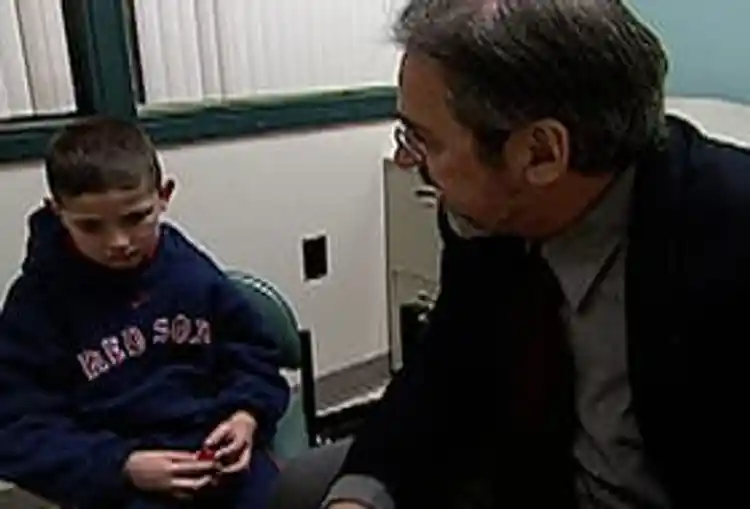Inside an Autism Assessment

Hide Video Transcript
Video Transcript
Narrator
From making his rounds at Boston Medical Center to answering questions on WebMD's parenting message boards, Dr. Steven Parker keeps his skills as a developmental pediatrician finely tuned. Steven Parker, MD
That's great Matt. You sit there. Narrator
On this day, he is evaluating six year old Mathew Walsh, who was diagnosed in the spring of 2005 with Asbergers, a high functioning form of autism. Steven Parker, MD
The thing that really separates autism from everything else is the unusual way they relate to other people, or more specifically, don't relate to other people, not making good eye contact, not seeing that other people are there, being kind of off in their own world. Steven Parker, MD
Matt, What school do you go to? Matt
The Fisher School Steven Parker, MD
The FISHER! Steven Parker, MD
Some kids with high functioning autism they do make pretty good eye contact, they are pretty related so it can be very hard to try and figure out, especially in children who are doing well early on, could this be something on the autism spectrum, or not? Steven Parker, MD
Show me your left hand z Narrator
One of the keys to Matt's early diagnosis was his unusual clapping behavior, called "stimming". Mary Tracey-Walsh
Stimming is something Matthew does and other children do it on the spectrum, to help them self regulate, help them self organize. He wakes up in the middle of the night and he'll be doing this or clapping, and he doesn't even know he's doing it. Steven Parker, MD
Is it getting better or worse? Mary Tracey-Walsh
Um, since the medication it's actually gotten better both at school and at home especially with,um, the clapping, they were really distracting in school. Steven Parker, MD
When you're very high functioning, there is a cost, you become aware as you get older, that heartbreakingly, that you can't relate to the other kids, they're not accepting you, you just don't have the social skills, you don't know how to do it, but you want to do it. Steven Parker, MD
So what color is the sky? Matt
Blue. Steven Parker, MD
Gimme five, you're the man. Let me write this down Steven Parker, MD
This was just a general global assessment to see if Matt is up to snuff for a 6 year old in his reading skills and his arithmetic skills and his fine motor skills Steven Parker, MD
Can you draw a triangle just like that? Steven Parker, MD
He has a very hard time with sort of visual motor things. Handwriting is likely to be a big issue with him. Steven Parker, MD
Can you read these words? What does that say? Matt
Cuh, rrr. Steven Parker, MD
You're sounding it out. Matt
Car. Steven Parker, MD
Car! Man, that's very good. Steven Parker, MD
Although he's maybe a little behind many 6 year olds, there's no question, he'll be a reader and will be able to read. Steven Parker, MD
How are an apple and an orange alike? Matt
Because you both eat them. Steven Parker, MD
Neat. How'd you get to be so smart? Steven Parker, MD
What you want the child to say is fruit, because that's a category, and it's kind of a higher level, but Matt was very concrete, and said they are both good to eat. but what we are looking for is more conceptual, so I think he's pretty concrete in categories and higher order things are going to come slower to him. But he's bright and they will come. Steven Parker, MD
Now, this is going to be a hard one. Are you ready? Matt
Yeah. Matt
Yeah. Steven Parker, MD
I'm not a neuropsychologist, I don't do as detailed exams as many, the exam is a way for me to interact with the child, so when I'm working with Matt, I'm watching is he making eye contact, how is he relating to me, what are his problem solving skills? Steven Parker, MD
Give it a try, do your best. Steven Parker, MD
If I ask him to do something he can't do, does he persist and try to keep doing it, or does he give up right away, and he has an expectation to fail? Steven Parker, MD
How does he use adults, someone like me to help him answer questions, what's he like emotionally during it? Is he happy, is he sad, is he depressed? All of that information, for a developmental pediatrician is in some ways just as, or more important than his fine motor skills that he demonstrated on this specific test. Yes, they have a disability, yes they have a hard time learning but boy they really can stick with it, and really work hard, and they are the kind of kid who is going to work to overcome and have a better chance at overcoming those challenges than a child who just gives up, and I don't want to do it, and forget about it, and you know has the expectation of failing and gets very depressed about it. Steven Parker, MD
What are you going to be when you grow up? Matt
What? Steven Parker, MD
What do you want to be? Matt
What? Steven Parker, MD
We saw all the things you want to see in a kid. He was cooperative, he was fun, he listened, he wanted to succeed, and he worked at it, and so that's why I'm optimistic for Matt. Mary
Thank you Doctor. Steven Parker, MD
Great, well, it's been terrific. Alright, buddy, let's go. Matt
Where? Steven Parker, MD
We're going to go out. You're going to go out and go back home, OK? Narrator
For WebMD, I'm Sandee LaMotte